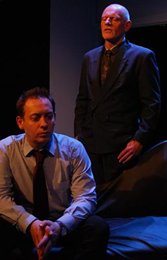“It’s not how it is, it’s how it looks.” This is the common refrain in Jane McCarthy’s Overtime, a play that is both a deranged man’s conversation with himself, and a discussion between two businessmen on the ethics of the corporate world.
Overtime begins far past the end of the working day. John (Stewart Roche) is asleep on a day bed in his office. A phone is ringing. Frank (Gerard Byrne) requests that he answer it. John refuses to budge. Frank continues to needle him. The phone stops ringing eventually, but the barbs do not stop. If they were colleagues, or even friends, you’d say there was something unusual about the intimacy between Frank and John, but as it becomes quickly clear, Frank isn’t really there. He’s a construction of John’s guilt-ridden overworked psyche. Even these first minutes of the play, the destination of Overtime – John’s eventual implosion – is never really in doubt.
McCarthy is a young playwright and she attempts to position Overtime as an office tragedy. John, the vain, ambitious tyro has brazenly overtaken middle-aged, down-on-his-luck Frank– the only person in the office who can see through John – on his climb up the social ladder, and even contributes to his death. Over the course of the play, we learn that John has made an error of monumental financial proportions and the harder he tries to cover his tracks, the more he’s distracted by Frank and his rambling interrogations.
 Overtime’s central preoccupation is in critiquing the moral quagmire of corporate culture, but it is unmoored to any specific context. Beyond a reference to Frank’s son studying at Oxford, the play deliberately avoids bridling the characters with particulars like job titles, professions or nationalities. The office décor of Phillipa Kavanagh’s set does not give much away either, and thus the overall impression is of two everymen at sea in a contemporary cutthroat business world. Overtime is thus extremely familiar but politically neutered.
Overtime’s central preoccupation is in critiquing the moral quagmire of corporate culture, but it is unmoored to any specific context. Beyond a reference to Frank’s son studying at Oxford, the play deliberately avoids bridling the characters with particulars like job titles, professions or nationalities. The office décor of Phillipa Kavanagh’s set does not give much away either, and thus the overall impression is of two everymen at sea in a contemporary cutthroat business world. Overtime is thus extremely familiar but politically neutered.
There is a lot of promise in McCarthy’s text, particularly when some of the back and forth between John and Frank veers into a kind of Beckettian officespeak. Its biggest problem, ultimately, is a sort of technical leapfrog attempted in the second half of the play when Overtime attempts to tell the story of John’s first day at the office up to Frank’s ultimate demise. This flashback involves changes to the character and mood of the play that seem both jarring and redundant.
This production was carried throughout by Byrne, who moved throughout the set with a lithe potency that contrasted sharply with that of Roche, who, appropriately for this role, had the look of a hungover James Spader. Director Caroline Fitzgerald finds effective ways to make the two characters seem divergent while showing they’re part of the same psyche, especially during two set pieces where John and Frank stand in a line, one crouched, the other standing tall, facing the audience, like a singular, two-headed creature.
The relatively short play is divided into many small scenes, and the eerie, repetitive original score by Paul Simon McCarthy enhances the tension during these breaks. John Crudden’s lighting design casts a new layer of meaning onto the play, allowing the play to shift gears and moods while allowing the characters, Frank especially, to ponder darker truths. Kavanagh’s set design was one of the more interesting ones I’ve seen at the New Theatre. It featured a towering piece of furniture that looked like a bookcase, but only contained a bottle of Jameson. It was a subtle commentary on what occupied the imaginations of these men.
As John unravels and unravels, it becomes clear to both himself and the audience that the only way to silence Frank is to join him in a place beyond the world. McCarthy does not give us the satisfaction, though, and Overtime ends on an ambiguously gloomy note, as John admits he doesn’t possess the mental strength to end his own life, and thus shut Frank up. While the play’s exploration of the corporate world doesn’t really satisfy, there’s still something commendably ambitious and nearly successful in McCarthy’s probing of the depths of human guilt.
Donald Mahoney is a writer and journalist.